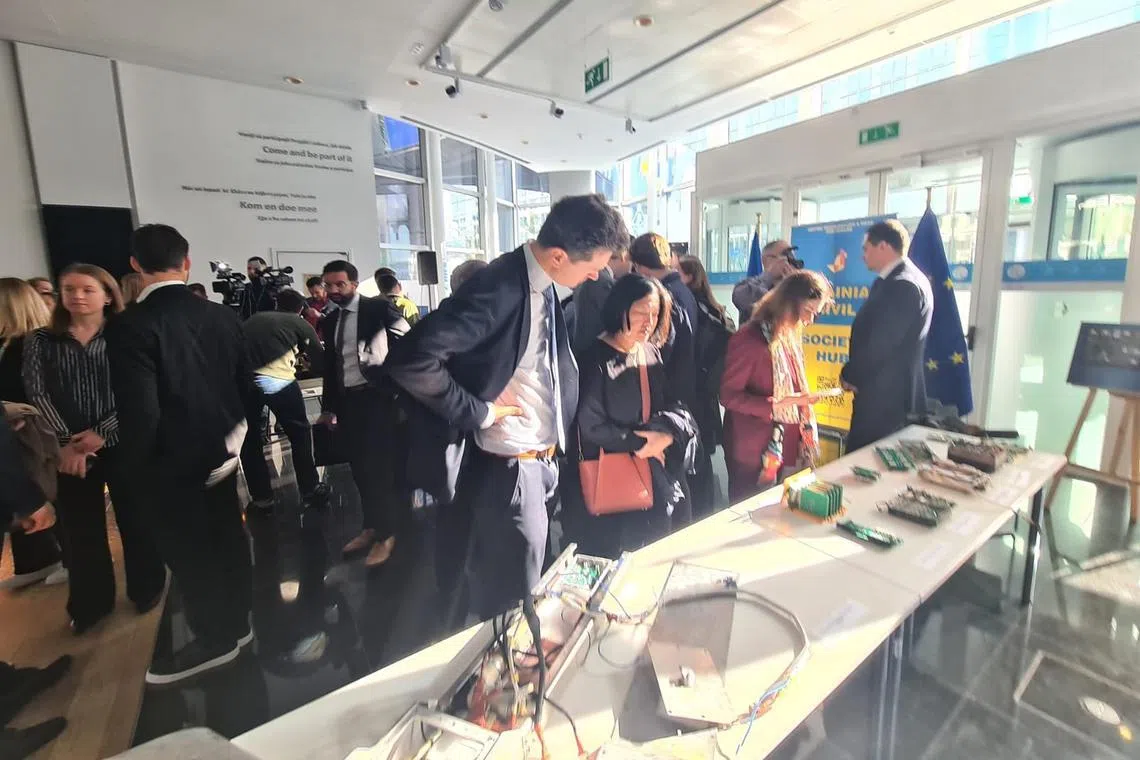Ukraine presses EU to do more to stop tech reaching Russia
Sign up now: Get ST's newsletters delivered to your inbox

Kyiv put on display in Brussels some of the missile and drone tech that has been used to devastate Ukraine since Russia's all-out 2022 invasion of its neighbour.
PHOTO: @UA_EUMISSION
BRUSSELS - The European Union needs to get tougher on countries that allow Western technology to transit to Russia for use in its war on Ukraine, Kyiv’s top sanctions official said on Sept 24.
The EU has imposed 14 rounds of unprecedented sanctions against Moscow since it launched an all-out invasion of its pro-Western neighbour in February 2022.
But the 27-nation bloc has struggled to stop the flow of banned products - such as microchips - that have ended up being used in missiles and drones used to devastate Ukraine.
Kyiv put some of that tech on display on Sept 24 at an exhibition in Brussels of foreign-made components recovered from Russian weaponry found on the battlefield.
Ukrainian and EU officials have been seeking to increase pressure on countries including Turkey, the United Arab Emirates, and former Soviet states in Central Asia to halt the reshipment of sensitive goods.
The EU has already imposed bans on doing business with dozens of companies from a raft of countries over evidence they are funnelling goods to the Russian military.
But the bloc has stopped short of using powers to prohibit sales of sensitive goods to entire countries and targeting banks being used to finance trade - relying more on diplomatic pressure.
“The EU, as well as some of the other partners, has been doing quite a lot of diplomacy in these areas,” said Mr Vladyslav Vlasiuk, sanctions adviser to Ukraine’s president.
“That’s been quite helpful. But I’m also afraid that sometimes diplomacy is probably not enough, so some more harsh measures should also be introduced.”
Western officials insist that they are having an impact with their push in third countries.
They say the US has also been effective in wielding the threat of sanctions against banks involved in facilitating trade in banned goods.
“We have had some success in making it more difficult, more expensive for Russia to access them, but the fact remains, there are still ways of circumvention,” said EU sanctions envoy David O’Sullivan.
“Every time we close one path of circumvention, another one is opened.”
Officials say Russia has increasingly begun to turn to countries in South-east Asia, such as Thailand and Malaysia, to get around EU sanctions.
Mr O’Sullivan said the EU was also working on “how to control as far as possible, the full extent of the supply chain” of tech made by firms in the bloc.
One option could be to extend restrictions on re-exporting to Russia to cover subsidies of European companies outside the EU, but not all members states are on board.
While curbing exports of products from the EU could help hamper Russia’s war machine, the bloc can do little to prevent technology flowing from key supplier China.
Mr Vlasiuk estimated that Chinese components made up roughly 60 per cent of the technology Ukraine found in Russian weaponry on the battlefield. AFP


